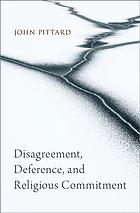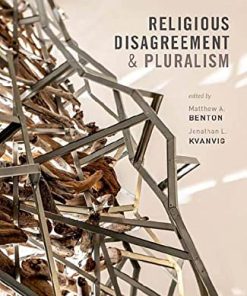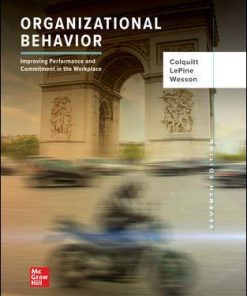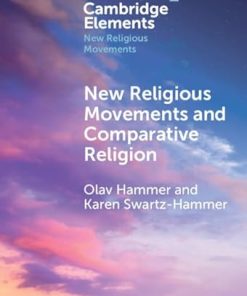(EBook PDF) Disagreement deference and religious commitment 1st edition by John Pittard 0190051833 9780190051839 full chapters
$50.00 Original price was: $50.00.$25.00Current price is: $25.00.
Disagreement, deference, and religious commitment 1st edition by John Pittard – Ebook PDF Instant Download/DeliveryISBN: 0190051833, 9780190051839
Full download Disagreement, deference, and religious commitment 1st edition after payment

Product details:
ISBN-10 : 0190051833
ISBN-13 : 9780190051839
Author: John Pittard
The striking extent of religious disagreement suggests that religious conviction is very often the result of processes that do not reliably produce true beliefs. For this reason, many have argued that the only rational response to religious disagreement is to adopt a religious skepticism that eschews confident religious belief. Disagreement, Deference, and Religious Commitment contests this skeptical conclusion, explaining how it could be rational to maintain confident belief even in the face of the epistemic worries posed by disagreement. John Pittard argues against the commitment to rigorous epistemic impartiality that underlies the case for disagreement-motivated religious skepticism, while also critiquing approaches to disagreement that allow for the unproblematic privileging of one’s first-person perspective.
Disagreement, deference, and religious commitment 1st Table of contents:
I.1 Topic and Approach
I.2 Overview of Chapters and Reading Guide
I. Against Impartiality
1. Disagreement-Motivated Religious Skepticism and the Commitment to Impartiality
1.1 First-Order and Higher-Order Challenges of Religious Disagreement
1.2 Introducing the Master Argument for Disagreement-Motivated Religious Skepticism
1.3 The Master Argument’s Critical Premise
1.4 The Striped Dress, and Two Commitments of the Disagreement Skeptic
1.4.1 An Internal Reason Constraint
1.4.2 An Agent Impartiality Constraint
1.5 Does Religious Disagreement Exhibit Internal, Third-Person Rational Symmetry?
1.6 Reasons Impartiality
2. Demotivating Reasons Impartiality
2.1 Christensen’s Case for Independence
2.2 Diagnosing Quick Dismissal without Appealing to Independence
2.2.1 Introduction to Bayesian Epistemology
2.2.2 A Bayesian Explanation of the Illegitimacy of Quick Dismissal
2.3 Explaining the Equal Weight Verdict without Appealing to Independence
2.4 Can the Restaurant Argument for Independence be Repaired?
2.5 Schellenberg on Impartiality and the Aims of Inquiry
2.5.1 Schellenberg’s Commitment to Reasons Impartiality
2.5.2 The Doxastic Minimalism Argument
2.6 A Jamesian Critique of Schellenberg’s Doxastic Minimalism
3. From Impartiality to Instrumentalism
3.1 The Equal Weight View and Instrumentalism
3.2 Prior Probability and Instrumental Trust
3.3 Instrumentalism and Fundamental Disagreements
3.4 Beyond Instrumentalism to Independence?
3.5 The Explanatory Power of Weak Conciliationism
3.6 Independence and the Scope of Partisan Justification
3.7 Two Objections to Weak Conciliationism
3.7.1 The Inaccuracy Objection
3.7.2 Does Instrumentalism Amount to an Independence Requirement?
3.8 Conclusion
4. Partisan Justification and Religious Belief
4.1 Sources of Partisan Justification: The Options
4.2 Against Radically Permissivist, Externalist, and Agent-Centered Accounts of Partisan Justification
4.3 Against Moderately Permissivist Accounts of Partisan Justification
4.4 For a Rationalist Account of Partisan Justification
4.4.1 Rationalism
4.4.2 Rationalist Partisan Justification
4.5 The False Hope of Reformed Epistemology
4.5.1 Alston
4.5.2 Plantinga
5. Affective Rationalism and Religious Insight
5.1 Religious Experience Marginalized?
5.2 Affective Rationalism
5.3 Can Worthiness Judgments Be Insightful?
5.4 Religious Emotions and Religious Concept Possession
5.5 Affectively Mediated Insight or Emotional Bias?
5.6 Rationalist Weak Conciliationism Applied
5.6.1 Forgotten Insight
5.6.2 Fading Insight and the Epistemic Utility of Spiritual Practices
5.6.3 Moderate Religious Insight in the Face of Religious Pluralism
5.7 Looking Ahead: Why the Rationalist Should Care about the Implications of Epistemic Impartiality
II. What Does Impartiality Require?
6. Elusive Impartiality
6.1 Self-Undermining Worries for Conciliationism
6.2 Why Resolute Conciliationism May Not Be Arbitrary
6.3 Implications of the Self-Undermining Challenge for Religious Disagreement
6.4 The Plurality Approach to Religious Impartiality
6.5 Religious Upbringing, Bias, and Group Reliability
6.6 The Defector Approach
6.7 The Expert Approach
6.8 The Challenge of Deep Disagreement
6.9 The Imprecision Approach
6.10 Conclusion
7. Unpalatable Conclusions and Deliberative Vertigo
7.1 Cost-Benefit Reasoning and Unpalatable Conclusions
7.2 Normative Uncertainty and Deliberative Vertigo
7.3 Grappling with the Nowhere to Stand Argument
7.3.1 Questioning the Endorsement Requirement
7.3.2 Challenging the Certainty Requirement
7.3.3 Questioning Whether Certainty Is Available to Nonconciliationists
7.4 Refusing Doubt
People also search for Disagreement, deference, and religious commitment 1st:
disagreement deference and religious commitment
difference between disagreement and conflict
difference between argue and disagree
religious disagreements
examples of disagreements in religion
Tags:
Disagreement,deference,religious commitment,John Pittard
You may also like…
Religion & Spirituality - Other Religions
Uncategorized
Fiction - Psychological
Business & Economics - Management & Leadership
Organizational Behaviour: Improving Performance and Commitment in the Workplace 5th Canadian Edition
Psychology - Clinical Psychology
The Oxford Handbook of Acceptance and Commitment Therapy 1st Edition
Business & Economics - Responsibility and Business Ethics
Religion & Spirituality - Religious Studies












